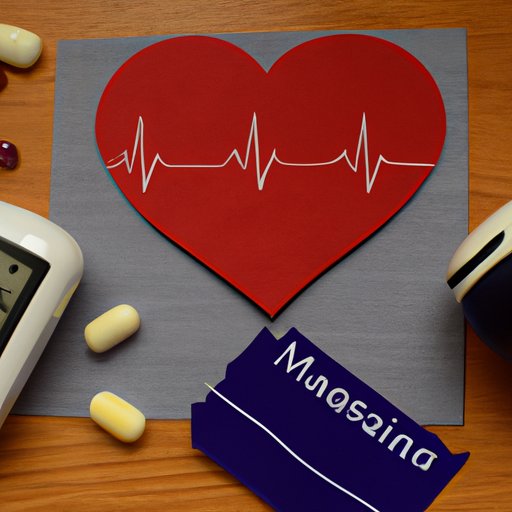Introduction
Heart palpitations are an uncomfortable sensation in the chest that can be caused by a variety of factors. It is characterized by a rapid or irregular heartbeat, and may be accompanied by other symptoms such as lightheadedness, dizziness, chest discomfort, and shortness of breath. Although it is usually not a serious medical condition, it can be alarming and cause anxiety. Fortunately, there are several steps you can take to reduce the likelihood of experiencing heart palpitations after eating.
Avoid Eating Too Much
Eating too much food in one sitting can increase your risk of experiencing heart palpitations. Eating smaller meals more frequently throughout the day can help to regulate your blood sugar levels and reduce the strain on your digestive system, which can help to prevent heart palpitations. Additionally, practicing portion control can help to ensure that you don’t overeat. Try using smaller plates and measuring out your food, and avoid mindless snacking throughout the day.
Eat Slowly and Mindfully
It’s important to take the time to savor each bite of food. Eating slowly helps to ensure that your body has time to process the food and signals to your brain when you are full. According to a study published in the journal Appetite, “Eating slowly may help to reduce meal size and energy intake at subsequent meals.” Additionally, try to practice mindful eating, which involves being aware of your physical and emotional responses to food. This can help to reduce the likelihood of overeating and improve digestion.
Avoid Caffeine and Alcohol
Caffeine and alcohol can both have an impact on your heart rate, so it’s best to limit your consumption of these substances. According to the Mayo Clinic, even small amounts of caffeine can have an effect on the heart, causing it to beat faster. Similarly, drinking alcohol can also increase your heart rate and lead to heart palpitations. If you do choose to drink, make sure to stay within the recommended limits of no more than two drinks per day for men and one drink per day for women.
Increase Magnesium Intake
Magnesium is a mineral that plays an important role in keeping the heart healthy. A deficiency in magnesium can lead to an irregular heartbeat and heart palpitations. Increasing your intake of magnesium-rich foods can help to reduce the likelihood of experiencing palpitations. Foods high in magnesium include dark leafy greens, nuts and seeds, fish, and avocados. You can also opt for a supplement if necessary.
Reduce Stress Levels
Stress can have a direct effect on your heart rate and can lead to heart palpitations. Taking time to relax and practice deep breathing exercises can help to lower your heart rate and reduce the risk of palpitations. Additionally, exercising regularly can help to reduce stress levels and promote overall wellbeing. Choose activities that you enjoy and make them part of your daily routine.
Exercise Regularly
Exercising on a regular basis can help to reduce the risk of heart palpitations after eating. According to a study published in the journal Circulation, aerobic exercise can help to reduce the number of episodes of heart palpitations in patients with atrial fibrillation. Low-impact exercises such as walking, swimming, and yoga can all help to reduce stress and improve heart health. Aim for at least 30 minutes of moderate to vigorous exercise each day.
Talk to Your Doctor
If you experience heart palpitations after eating, it is important to speak with your doctor. They will be able to determine the underlying cause and provide advice on how to manage your symptoms. Be sure to keep track of your symptoms and share any warning signs with your doctor, such as chest pain, difficulty breathing, or dizziness.
Conclusion
Heart palpitations can be an alarming symptom, but there are several steps you can take to reduce the risk of experiencing them after eating. Eating smaller meals more frequently, practicing mindful eating, avoiding caffeine and alcohol, increasing your magnesium intake, reducing stress levels, and exercising regularly can all help to reduce the likelihood of experiencing heart palpitations. If you experience persistent or severe symptoms, be sure to speak with your doctor.
(Note: Is this article not meeting your expectations? Do you have knowledge or insights to share? Unlock new opportunities and expand your reach by joining our authors team. Click Registration to join us and share your expertise with our readers.)
